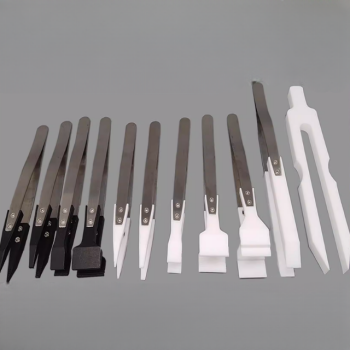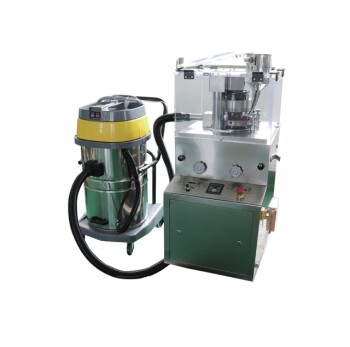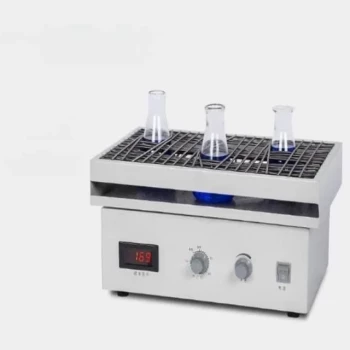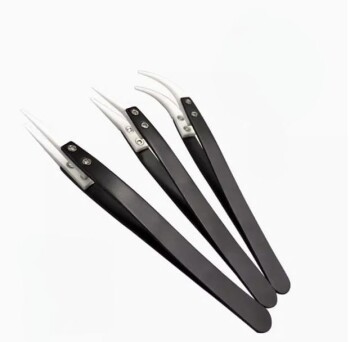Freeze drying is a critical preservation method in research because it removes water from a sample without damaging its underlying structural or chemical integrity. This process, known as lyophilization, allows for long-term storage of sensitive biological and chemical materials, effectively pausing degradation and ensuring the sample remains authentic for future analysis.
The core problem in sample preservation is that water enables the biological and chemical processes that cause degradation. Freeze drying solves this by gently removing water through sublimation—turning ice directly into vapor—which preserves the sample's original structure and composition, making it the gold standard for long-term stability in research.

The Core Principle: Preservation Through Sublimation
Freeze drying is fundamentally different from simple dehydration or heating. Its unique process is what makes it so valuable for preserving delicate materials.
From Solid Directly to Gas
The process begins by completely freezing the sample. The pressure is then lowered to create a vacuum, and a small amount of heat is added.
This specific set of conditions causes the frozen water crystals to sublimate, meaning they turn directly from a solid (ice) into a gas (water vapor), bypassing the destructive liquid phase entirely.
Avoiding Structural Damage
In standard dehydration, liquid water moving out of a sample can exert powerful surface tension forces. This can collapse delicate structures like cell walls or alter the intricate folding of a protein.
Because sublimation avoids a liquid phase, freeze drying leaves the sample's "scaffolding" intact, resulting in a lightweight, porous material that retains its original shape and size.
Halting Degradation Pathways
Water is the medium in which most biological and chemical reactions occur. By removing nearly all of it, freeze drying effectively halts the two main causes of sample degradation.
It stops enzymatic activity and prevents the growth of microbes like bacteria and mold, which would otherwise break down the sample over time.
Key Benefits in a Laboratory Setting
The unique mechanism of freeze drying translates into several crucial advantages for scientific research, where sample integrity is paramount.
Unmatched Long-Term Stability
Freeze-dried samples are exceptionally stable and can be stored for years, often at room temperature. This is essential for longitudinal studies, where samples collected at different times must be directly comparable without any artifacts from degradation.
Preserving Biological Activity
For fields like biotechnology and pharmaceuticals, maintaining the function of molecules is key. Freeze drying is used to preserve the efficacy of proteins, enzymes, and vaccines.
When the sample is reconstituted with water, these complex molecules can refold into their active state, a feat often impossible with other drying methods.
Maintaining Chemical Purity
The process is vital for preserving the originality of chemical compounds and precursors. By preventing water-driven reactions, it ensures the chemical composition of the sample remains unchanged.
This is critical in material science for creating high-quality precursors for materials like graphene or for storing pure pharmaceutical compounds.
Simplifying Storage and Transport
Lyophilized samples are lightweight, compact, and do not require refrigeration. This dramatically simplifies the logistics of biobanking and sample shipping, reducing costs and minimizing the risk of spoilage during transit.
Understanding the Trade-offs
While powerful, freeze drying is not a universal solution and comes with practical considerations.
Process Time and Complexity
Freeze drying is a slow and deliberate process. Depending on the sample size and type, a single cycle can take anywhere from several hours to multiple days to complete correctly.
Equipment and Expertise
Laboratory freeze dryers, or lyophilizers, are specialized and costly pieces of equipment. Operating them effectively requires a solid understanding of the principles of heat transfer and vacuum pressure to develop a cycle optimized for a specific sample type.
Not All Samples Are Suitable
While it is a gentle method, the freezing process itself can still damage certain extremely fragile cellular structures. Each sample type must be evaluated to ensure it can withstand the initial freezing step without losing critical properties.
Making the Right Choice for Your Research
Ultimately, the decision to use freeze drying depends on the specific requirements of your samples and the long-term goals of your study.
- If your primary focus is long-term biobanking or longitudinal studies: Freeze drying is the superior method for ensuring sample consistency and preventing degradation over many years.
- If your primary focus is preserving protein, vaccine, or enzyme activity: Lyophilization is the industry standard for creating stable, biologically active products that can be easily stored and reconstituted.
- If your primary focus is creating pure chemical precursors: Freeze drying can produce highly stable, porous materials that are ideal for subsequent chemical reactions or material fabrication.
By leveraging freeze drying, you protect the integrity of your samples and ensure the long-term validity of your scientific conclusions.
Summary Table:
| Key Aspect | Why It Matters for Research |
|---|---|
| Preservation Method | Removes water via sublimation, avoiding structural damage. |
| Long-Term Stability | Enables storage for years, often at room temperature. |
| Biological Activity | Maintains function of proteins, enzymes, and vaccines. |
| Chemical Purity | Prevents degradation, ensuring sample authenticity. |
Protect your research investments with reliable sample preservation. KINTEK specializes in providing high-quality lab equipment, including freeze dryers (lyophilizers), to meet the precise needs of research laboratories. Our solutions help you maintain sample integrity for biobanking, longitudinal studies, and sensitive material storage. Ensure the long-term validity of your scientific work—contact our experts today to find the perfect preservation system for your lab.
Visual Guide

Related Products
- Benchtop Laboratory Freeze Dryer for Lab Use
- Three-dimensional electromagnetic sieving instrument
- Laboratory Hybrid Tissue Grinding Mill
- Manual Heated Hydraulic Press Machine with Heated Plates for Laboratory Hot Press
- Double Plate Heating Press Mold for Lab
People Also Ask
- How much can proper freeze drying reduce drying times? Cut Drying Time by Up to 30%
- In which fields is the laboratory freeze dryer commonly used? Essential for Biopharma, Food Science & Research
- What is a lyophilizer and how does it work? Unlock Superior Preservation for High-Value Materials
- What is the key takeaway when selecting a lab freeze dryer? Let Your Sample's Needs Guide Your Choice
- What is a Laboratory Freeze Dryer and what is its primary function? Achieve Perfect Preservation of Sensitive Materials



















